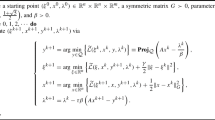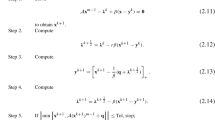Abstract
An improved conjugate gradient algorithm is proposed that does not rely on the line search rule and automatically achieves sufficient descent and trust region qualities. It is applicable to solve unconstrained problems and large-scale nonsmooth problems. Furthermore, it demonstrates global convergence properties without the need for Lipschitz continuity conditions. Numerical experiments on nonconvex unconstrained problems and large scale nonsmooth convex optimization problems demonstrate the effectiveness and efficiency of the proposed algorithm compared with the same structural algorithm. Finally, the new algorithm is applied to Muskingum model solving in engineering problems and image restoration, which shows the prospect of the new algorithm.











Similar content being viewed by others
References
Yuan, G., Yang, H., Zhang, M.: Adaptive three-term PRP algorithms without gradient Lipschitz continuity condition for nonconvex functions. Numer. Algorithms 91(1), 145–160 (2022)
Yuan, G., Zhang, M., Zhou, Y.: Adaptive scaling damped BFGS method without gradient Lipschitz continuity. Appl. Math. Lett. 124, 107634 (2022)
Yuan, G., Li, P., Lu, J.: The global convergence of the BFGS method with a modified WWP line search for nonconvex functions. Numer. Algorithms 91(1), 353–365 (2022)
Perry, A.: A class of conjugate gradient algorithms with a two-step variable-metric memory. Technical Report Discussion Paper 269, Center for Mathematical Studies in Economics and Management Sciences, Northwestern University, Evanston, Illinois (1977)
Shanno, D.F.: Conjugate gradient methods with inexact searches. Math. Oper. Res. 3(3), 244–256 (1978)
Dai, Y., Kou, C.: A nonlinear conjugate gradient algorithm with an optimal property and an improved Wolfe line search. SIAM J. Optim. 23(1), 296–320 (2013)
Li, M.: A modified Hestense-Stiefel conjugate gradient method close to the memoryless BFGS quasi-Newton method. Optim. Methods Softw. 33(2), 336–353 (2018)
Li, M.: A three term Polak-Ribière-Polyak conjugate gradient method close to the memoryless BFGS quasi-Newton method. J. Ind. Manag. Optim. 16(1), 245–260 (2018)
Yuan, G., Wei, Z.: Convergence analysis of a modified BFGS method on convex minimizations. Comput. Optim. Appl. 47(2), 237–255 (2010)
Conn, A.R., Gould, N.I., Toint, P.L.: vol. 286, pp. 186–195. Society for Industrial and Applied Mathematics (2000)
Fukushima, M., Qi, L.: A globally and superlinearly convergent algorithm for nonsmooth convex minimization. SIAM J. Optim. 6(4), 1106–1120 (1996)
Dolan, E.D., Moré, J.J.: Benchmarking optimization software with performance profiles. Math. Program. 91, 201–213 (2002)
Yin, J., Jian, J., Jiang, X., Liu, M., Wang, L.: A hybrid three-term conjugate gradient projection method for constrained nonlinear monotone equations with applications. Numer. Algorithms 88, 389–418 (2021)
Lukšan, L., Vlcek, J.: Test problems for nonsmooth unconstrained and linearly constrained optimization. Technical Report Technical Report No. 798, Institute of Computer Science, Academy of Sciences of the Czech Republic (2000)
Ouyang, A., Liu, L.-B., Sheng, Z., Wu, F., et al.: A class of parameter estimation methods for nonlinear Muskingum model using hybrid invasive weed optimization algorithm. Math. Probl. Eng. 2015, 573894 (2015)
Ouyang, A., Tang, Z., Li, K., Sallam, A., Sha, E.: Estimating parameters of Muskingum model using an adaptive hybrid PSO algorithm. Int. J. Pattern Recognit Artif Intell. 28(1), 1459003 (2014)
Funding
This work is supported by Guangxi Science and Technology base and Talent Project (Grant No. AD22080047), the National Natural Science Foundation of Guangxi Province (Grant No. 2023GXNFSBA 026063), the Innovation Funds of Chinese University (Grant No. 2021BCF03001), and the special foundation for Guangxi Ba Gui Scholars.
Author information
Authors and Affiliations
Corresponding author
Ethics declarations
Conflict of interest
The authors declare to have no Conflict of interest.
Additional information
Publisher's Note
Springer Nature remains neutral with regard to jurisdictional claims in published maps and institutional affiliations.
Rights and permissions
Springer Nature or its licensor (e.g. a society or other partner) holds exclusive rights to this article under a publishing agreement with the author(s) or other rightsholder(s); author self-archiving of the accepted manuscript version of this article is solely governed by the terms of such publishing agreement and applicable law.
About this article
Cite this article
Liu, H., Feng, H. A conjugate gradient algorithm without Lipchitz continuity and its applications. J. Appl. Math. Comput. (2024). https://doi.org/10.1007/s12190-024-02088-2
Received:
Revised:
Accepted:
Published:
DOI: https://doi.org/10.1007/s12190-024-02088-2




